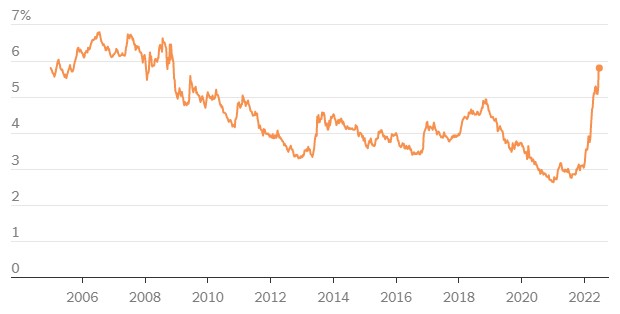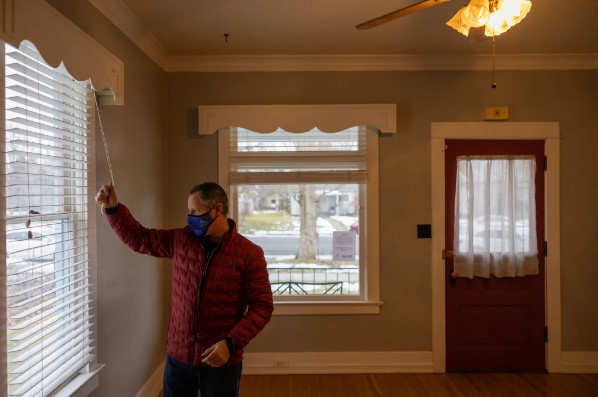Are Mortgage Rates Finally Impacting Housing Sales?
Originally Published by: The New York Times — June 29, 2022
SBCA appreciates your input; please email us if you have any comments or corrections to this article.
For the past two years, anyone who had a home to sell could get practically any asking price. Good shape or bad, in cities and in exurbs, seemingly everything on the market had a line of eager buyers.
 Credit William DeShazer for The New York Times
Credit William DeShazer for The New York Times
Now, in the span of a few weeks, real estate agents have gone from managing bidding wars to watching properties sit without offers, and once-hot markets like Austin, Texas, and Boise, Idaho, are poised for big declines.
The culprit is rising mortgage rates, which have spiked to their highest levels since the 2008 housing crisis in response to the Federal Reserve’s recent efforts to tame inflation. The jump in borrowing costs, adding hundreds of dollars a month to the typical mortgage payment and coming on top of two years of home price increases, has pushed wishful home buyers past their financial limits.
“We’ve reached the point where people just can’t afford a house,” said Glenn Kelman, chief executive of Redfin, a national real estate brokerage.
Weekly average 30-year fixed mortgage rate

Source: Freddie Mac By The New York Times
More than any other part of the economy, housing — a purchase that for most buyers requires taking on huge amounts of debt — is especially sensitive to interest rates. That sensitivity becomes even more pronounced when homes are unaffordable, as they are now. As a result, home prices and new construction are a central component of the Federal Reserve’s efforts to slow rapid inflation by raising interest rates, which the central bank has done several times this year. But the Fed’s moves come with an inherent risk that the economy will spiral into a recession if they stifle home purchases and development activity too much.
While housing does not account for a huge amount of economic output, it is a boom-bust industry that has historically played an outsize role in downturns. The sector runs on credit, and new home purchases are often followed by new furniture, new appliances and new electronics that are important pieces of consumer spending.
“We need the housing market to bend to rein in inflation, but we don’t want it to break, because that would mean a recession,” said Mark Zandi, chief economist at Moody’s Analytics.
Home prices are still at record levels, and they are likely to take months or longer to fall — if they ever do. But that caveat, which real estate agents often hold up as a shield, cannot paper over the fact that demand has waned considerably and that the market direction has changed.
Sales of existing homes fell 3.4 percent in May from April, according to the National Association of Realtors, and construction is also down. Homebuilders that had been parsing out their inventory with elaborate lotteries now say their pandemic lists have shriveled to the point that they are lowering prices and sweetening incentives — like cheaper counter and bathroom upgrades — to get buyers over the line.
Understand Inflation and How It Impacts You
- Inflation 101: What’s driving inflation in the United States? What can slow the rapid price gains? Here’s what to know.
- Inflation Calculator: How you experience inflation can vary greatly depending on your spending habits. Answer these seven questions to estimate your personal inflation rate.
- Greedflation: Some experts say that big corporations are supercharging inflation by jacking up prices. We take a closer look at the issue.
- Changing Behaviors: From driving fewer miles to downgrading vacations, Americans are making changes to their spending because of inflation. Here’s how five households are coping.
“There was this collective belief that housing was invincible — that it was so undersupplied and demand so high that nothing could stop price growth,” said Ali Wolf, chief economist with Zonda, a housing data and consulting firm. “A very rapid increase in interest rates and home prices has proven that theory to be false.”
It is a stark change for a market that blossomed soon after the initial shock of the pandemic, which for many people turned out to be a perfect time to buy a home. Rock-bottom mortgage rates lowered borrowing costs, while the shift to home offices and Zoom meetings opened up new swaths of the country to buyers who had been struggling to penetrate the market near the jobs they once commuted to.
That caused prices to explode in far-flung exurbs and once-affordable places like Spokane, Wash., where a crush of new home buyers decamped from pricey West Coast cities. People became so willing to move long distances to buy a home that “the normal laws of supply and demand didn’t apply,” Mr. Kelman said.
After two years of swift price increases, however, places that once seemed cheap no longer are. Home values have risen about 40 percent over the past two years, according to Zillow, forcing buyers to stretch ever further in price even as they run out of geography.
Now add in mortgage rates, which have nearly doubled this year. And inflation, which is eating into savings for some families as it increases household expenses. And a wobbly stock market, which has reduced the value of portfolios that many buyers intended to tap for a down payment.

Credit Todd Anderson for The New York Times
Larisa Kiryukhin and her family were long ago priced out of the San Francisco Bay Area, where they had lived for decades. Ms. Kiryukhin, 44, is a medical assistant who was tied to her hospital, but the pandemic gave her husband, who works in information technology, the flexibility to move to a more affordable city. So Ms. Kiryukhin switched jobs, and this year the couple and their two children moved to Tampa, Fla., in hopes of buying a home.
Inflation F.A.Q.
What is inflation? Inflation is a loss of purchasing power over time, meaning your dollar will not go as far tomorrow as it did today. It is typically expressed as the annual change in prices for everyday goods and services such as food, furniture, apparel, transportation and toys.
What causes inflation? It can be the result of rising consumer demand. But inflation can also rise and fall based on developments that have little to do with economic conditions, such as limited oil production and supply chain problems.
Is inflation bad? It depends on the circumstances. Fast price increases spell trouble, but moderate price gains can lead to higher wages and job growth.
How does inflation affect the poor? Inflation can be especially hard to shoulder for poor households because they spend a bigger chunk of their budgets on necessities like food, housing and gas.
Can inflation affect the stock market? Rapid inflation typically spells trouble for stocks. Financial assets in general have historically fared badly during inflation booms, while tangible assets like houses have held their value better.
In April, the family went into contract on a $425,000 house and was quoted an interest rate of 4 percent. Then the closing date was extended because the seller wanted time to find a new home. Then interest rates jumped, adding about $700 to the monthly payment, and the family backed out.
“I moved here just to buy a house, and here we go: The prices got so high we can’t afford it,” Ms. Kiryukhin said.
The typical home buyer makes about $70,000 a year, according to Moody’s Analytics. A $600-a-month increase in housing costs — about how much rising interest rates have added to the typical mortgage payment — is more than most people can shoulder.
Steve Silbar, a real estate agent in Spokane, Wash., said he had seen a sharp deterioration in interest among buyers looking for homes under $500,000. Those buyers typically have less cash, so rising mortgage rates “have moved them out of the market,” he said.

Credit Rajah Bose for The New York Times
Heather Renz and her husband, clients of Mr. Silbar’s, were preparing to buy a home for $360,000. Ms. Renz is her mother’s caregiver. To qualify for a mortgage, her husband, who works as a technician at an aerospace company, was going to pull money out of his retirement account and bolster their down payment. But the recent stock market declines pushed the amount he could withdraw below what they needed to qualify.
“We were three-quarters of the way through the process,” Ms. Renz said.
The interest rate on a 30-year fixed rate mortgage has risen to 5.81 percent from 3.22 percent in the first week of January, according to the mortgage giant Freddie Mac. Some of that adjustment anticipated future Fed interest rate increases. Officials raised rates by three-quarters of a percentage point in June alone, the largest increase since 1994, and have signaled that a similarly large move is on the table in July. Any further surprises could push mortgage rates even higher.
Inflation is running at the fastest pace in 40 years, forcing the Fed to stake out an aggressive policy response to try to bring it under control.
Because higher interest rates slow down big purchases made on credit, from homes and cars to business equipment, they can limit demand and allow supply to catch up, tempering price increases across the economy.
